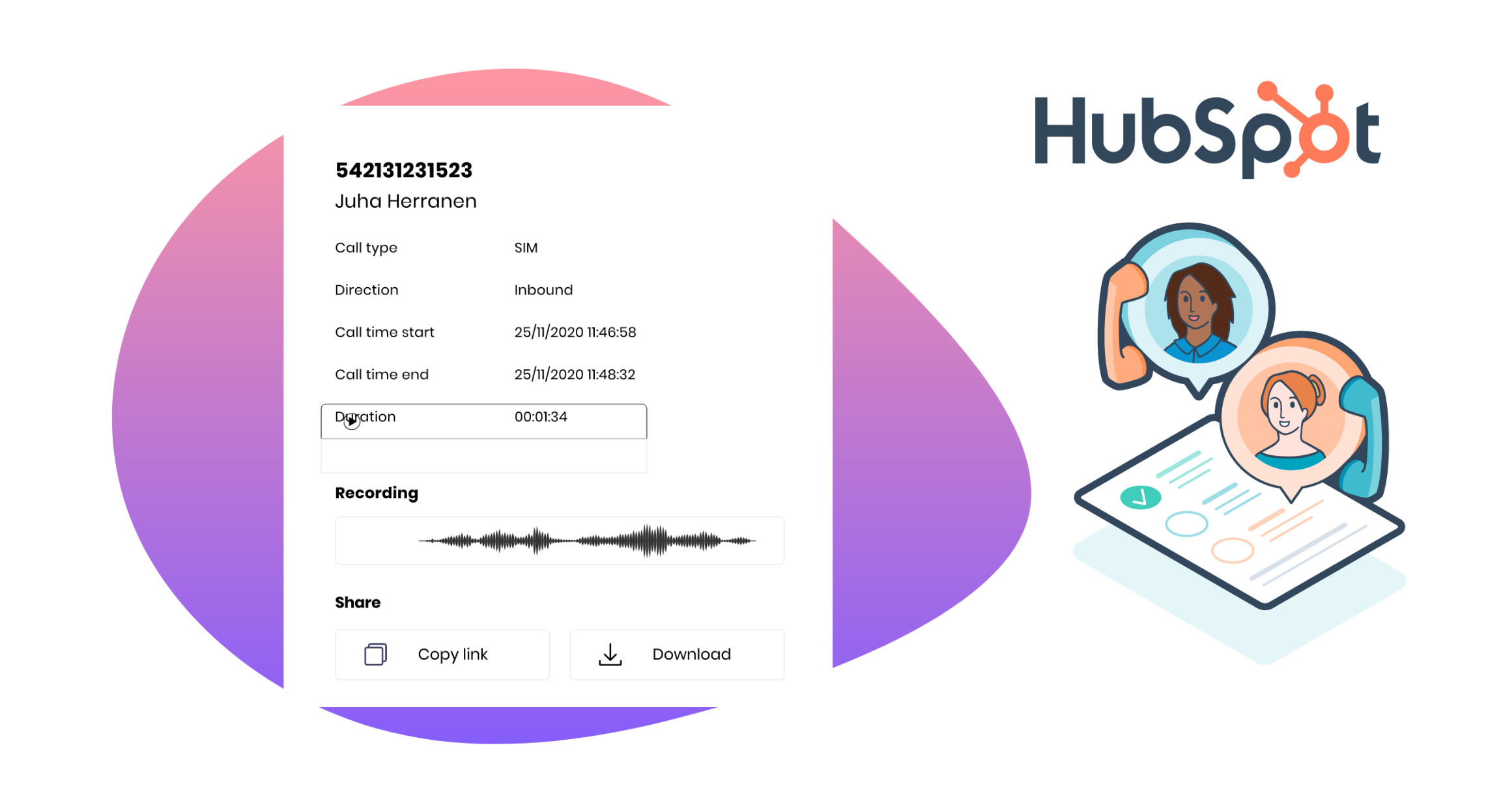
Having a call with your leads is like having the first date with your crush. You need to build connections with them through uncovering their needs and showing that you are their best fit through demonstrating your skills. To do that, asking good questions is a key. By asking right questions, sales reps can collect a treasure trove of important customers’ information that they can use later in the buying process. Additionally, with good questions, salespeople not only express that they care and want to solve the buyers’ problems but also show their expertise in the field.
You can learn what are good sales call questions by recording your call. With the recording, you can listen back and see how your prospects responded to the questions. Don’t know how to record mobile phone calls🤔? Check out our previous blog here. Or you can simply download Salestrail and start to record your calls automatically from today. (Salestrail also can log all call data for your sales team stress-free 😉)

In this blog, you can find a cheat sheet with all possible good questions separating into 7 categories that you can ask to make the most out of your sales calls.
Questions to build rapport with the prospects
Building rapport is essential for any business meeting, yet, it is even more important for sales calls. Without the rapport, your prospects can hang up the phone in five seconds. So how should you start your sales calls?
Firstly, not everyone likes engaging in unexpected calls. But if you greet them like an old friend, they might reconsider. You can start by saying: “Hello [Name], how have you been?”
After a warm greeting, now you need to show why they should maintain the call with you either by:
After making your prospects feel connected and stay in the line, the next step is to make them talk about their worries and needs.
Questions to identify the prospect’s problems and needs
At this point, every sales rep understands the importance of planning and researching about your prospects before making the actual sales calls right? (If not, we won’t judge 😉. You can quickly check out our guide for effective sales call planning here). Can you believe that only 13% of customers believe a salesperson can understand their needs? That is mainly because sales reps often start with presenting the company’s solution rather than asking customers to define the problems first. Therefore, rather than making a boring sales presentation, you should give the spotlight to your prospects, allowing them to speak about their problems. By asking these discovery questions, you can dig deeper to the main concerns of your prospects. Besides, please listen carefully to their answers in this section, you can identify which highlight services/products/features in your solution that your prospects cannot reject.
Top 10 questions for discovering your prospects’ needs:
Huhm, if you come well-prepared and the discovering questions above have already been answered in your book, a bit of validation for the pre-call research doesn’t hurt. Asking validation questions not only helps you to confirm your assumptions but also shows your prospects that you truly care and understand what they need and they can trust your suggestions.
Top 4 question to validate your pre-call research:
If the prospect actually leaves their contacts asking for the sales calls, then in this discovering stage, you might want to consider to use these below questions instead.
Top 8 questions to ask when your prospects start or ask for the calls:
Questions to formulate your solution
After confirming the needs, once you recognize that your product/service (or part of it ;) ) is a good fit for the prospects, you can start to build demand for your solution. By asking the right questions, you can gradually give out your solution in between the discussion. Remember when presenting your offer, try to repeat and highlight words that your prospects are using when answering these below questions.
Top 5 questions to formulate the your solution:
Questions to assess the prospect’s timeline
You might not close the deal in the first few sales calls but asking about the timing will help you to see if the solution is urgent for the prospects’ business. If the issue is urgent, congratulations, you are one step closer to the deal. If not, these questions will guide your prospects into thinking if they should act on the current problems faster. Besides, the timeline questions also give your understanding on what your prospects expect from your solution in a certain timeframe.
Top 6 questions to discover the solution timing:
Questions to assess the prospect’s budget
Most of the time your prospects might bring up questions about the costs if they are interested in your solution or they are actively looking for the solution. However, if they don’t, at some points of the discussion, you should start to tiptoe into the budget subject. These budget questions will give you a hint on whether this prospect will become your customer or not. How? Since with their answers, you would know if they can afford your solution or not. Besides, their attitude when answering these questions might also give you a hint on whether they are really interested in your solution or not. Not all prospects will become your customers, they might just be too polite to interrupt you ;), so save time for both would be a great choice in some situations.
Besides, if your solution’s price is tempting enough, bringing these budget questions up will speed up the sales process and help you to close the deal faster. For example, with Salestrail, our auto-call log solution only costs $2/month (super affordable, right✌?), we often make the other side impressed when bringing up the budget discussion.
Top 5 questions to discover the budget of your prospects:
Questions to explore the prospect’s buying process
Unless you tried to sell a product/solution for personal or household use, in most B2B sales calls, your recipients aren’t the only decision maker. Therefore, it is essential to know the buying steps in your prospects’ organization. The answers for these questions will help you to make sure if you have the right person to move forward with or if you should add other people to the conversation. Besides, it will also show the real interest of your prospects with the offered solution.
Top 5 questions to discover the steps necessary for closing the sale:
Probing questions - Questions that can be used to dig deeper in some areas of the discussion
Probing questions can be used at any point during the sales call where you want to dig deeper and gather more information about some area. These questions cannot be used separately but rather as a follow-up to during a discussed topic. Using probing questions at the right moment also can make your sales call more engaging to the prospects.
Top 6 probing questions:
Advancement questions - questions during the last minutes of the calls
Towards the end of the sales call, you need to wrap it up and see if the deal is getting closer or not. These advancement questions can be used to discover any final roadblocks that your prospects still highly concern. The answers can help you to prepare for the next calls or at least give a hint on whether you might have any chance with the prospects.
Top 5 advancement questions:
Besides, if your prospects ask for more time into thinking about your solution or refuse to give their answer this time. Don’t be sad! You still have many chances since study showed that sales people often make 6 calls to win a sale. Therefore, you can still suggest, schedule, or ask for permission on follow-up meetings using these below questions.
Top 5 follow-up and move-forward questions:
In general, it is hard to get your prospect even on the line since 80% of calls go to voicemail. So make sure that you can make the most out of your call time with the right question. In addition to these suggested sales questions above, you can also start recording all your sales calls as they will also give you a hint on which questions work best for your business. You can record your sales calls using Salestrail with only $2. Still not sure if it is right for you? Don’t worry, we got your back. You can have 5 day-free-trial here. (No bank info or credit card require 😉 )
Fredrikinkatu 33 A,
00120 Helsinki, Finland
Call :+358 40 768 3813
Email: support@liid.com
No Comments Yet
Let us know what you think